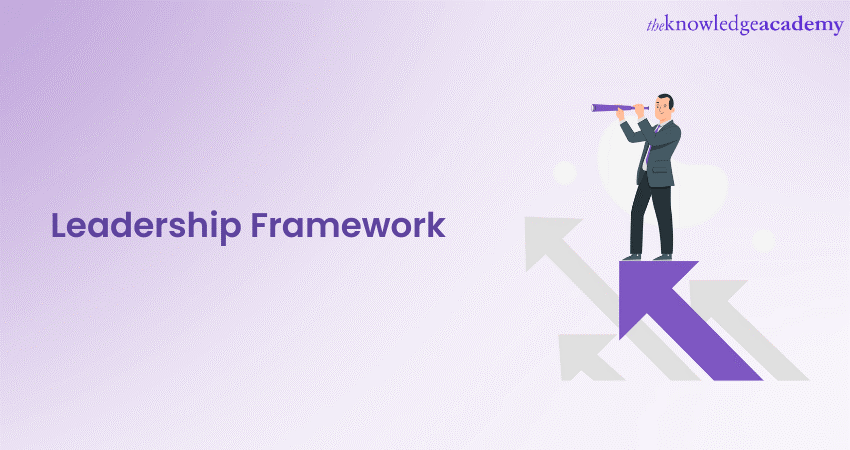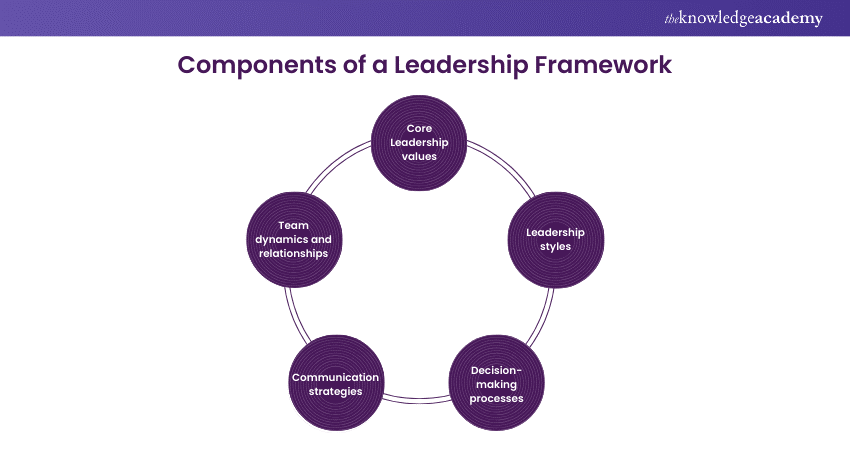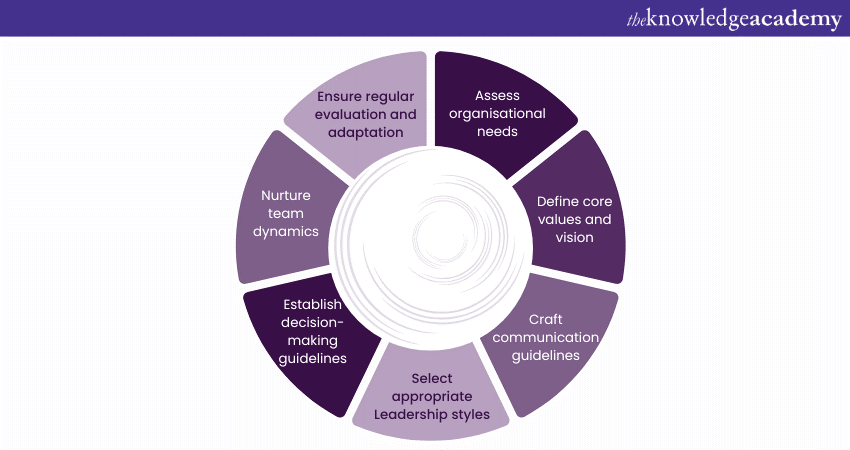We may not have the course you’re looking for. If you enquire or give us a call on 01344203999 and speak to our training experts, we may still be able to help with your training requirements.
Training Outcomes Within Your Budget!
We ensure quality, budget-alignment, and timely delivery by our expert instructors.

Effective Leadership is the cornerstone of successful organisations. Without proper Leadership, it can be challenging to channel business operation. This is where Leadership Framework comes in. It provides a structured approach to Leadership, guiding leaders in making decisions, fostering relationships, and achieving goals. Thus, it is crucial to follow this structure in order to streamline your processes and achieve success. In this blog, we will dive into the various aspects of Leadership Frameworks, their components, benefits, and how to develop and implement them.
Table of Contents
1) What is a Leadership Framework?
2) Components of a Leadership Framework
3) Benefits of implementing a Leadership Framework
4) How to develop an effective Leadership Framework?
5) Conclusion
What is a Leadership Framework?
A Leadership Framework is a strategic plan that defines the key principles, practices, and tools leaders use to lead effectively. It includes core values, preferred Leadership Styles, decision-making methods, communication techniques, and ways to promote teamwork. This structured approach provides leaders with a complete toolkit to deal with various challenges. Moreover, it helps them adjust to different situations, and match their actions with the organisation’s purpose.
By combining different elements, this model enables leaders to make smart decisions and motivate their teams. So, the Importance of Leadership Framework cannot be understated as it helps create a positive culture that flourishes on cooperation, development, and shared vision.
Components of a Leadership Framework
The Leadership Framework consists of several interconnected components that collectively shape a leader's approach and behaviour. These components are key for effective Leadership and include the following:

Core Leadership values
At the core of the Framework are the leader's fundamental values that guide their actions, decisions, and interactions. These values establish the leader's character and contribute to building trust within the team and the wider organisation.
Leadership styles
The framework offers a range of Leadership styles that leaders can adopt based on the situation. These styles, such as transformational, transactional, and servant Leadership, influence how leaders interact with their teams and drive performance.
Decision-making processes
Effective decision-making is facilitated by incorporating structured processes. The Framework provides decision-making models, like rational and intuitive approaches, to ensure well-informed choices that align with organisational goals.
Communication strategies
Clear communication is a vital aspect of Leadership. The Leadership Framework emphasises strategies for active listening, open dialogue, and adapting communication styles to suit diverse audiences.
Team dynamics and relationships
By recognising the importance of teamwork, the framework guides leaders in fostering positive relationships, resolving conflicts, and creating a cohesive and collaborative team environment.
Enhance your Leadership skills with our Leadership and Management Skills Course - Sign up now to become a more effective and confident leader!
Benefits of implementing a Leadership Framework
A Leadership Framework model offers a range of positive outcomes for both leaders and organisations. Let's explore the benefits of implementing this framework:
Better decision-making
Leadership Frameworks give leaders a clear and systematic way to make decisions. This helps them align their choices with the organisation’s values and goals, ensuring coherence and quality.
Collaborative environment
Leadership Frameworks foster a culture of effective communication and collaboration. They encourage team members to participate, cooperate, and share their diverse insights towards common aims.
Unified organisational culture
Leadership Frameworks often embody core values and a shared vision. Leaders who follow these values set an example that influences the whole organisation, creating a unified and positive workplace culture.
Leadership development
These Frameworks expose leaders to various Leadership styles, communication methods, and decision-making techniques. They help leaders improve their Leadership Skills, becoming more flexible and competent.
Higher employee engagement
Leadership Frameworks motivate leaders to involve team members in decision-making. This empowers employees and increases their job satisfaction, sense of ownership, and overall engagement.
Consistent Leadership
Leadership Frameworks help implement regular Leadership practices within a structured framework. This reduces ambiguity among team members and creates a stable environment, enabling them to work more confidently and efficiently.
Goal-oriented actions
Leadership Frameworks direct leaders to make decisions that align with the organisation’s overall strategy. This ensures that actions are relevant and contribute to achieving the organisation’s objectives.
Future-ready leaders
They help identify and develop potential leaders. They prepare future leaders with the necessary skills and values to take on Leadership roles effectively.
How to develop an effective Leadership Framework?
Creating an effective Leadership Framework model requires a systematic approach tailored to the organisation's needs. Here's a comprehensive process:

Assess organisational needs
Get started by conducting a thorough assessment of the organisation's current state identifying challenges, opportunities, and trends. Gather insights through surveys, interviews, and data analysis to inform the framework's development.
Define core values and vision
Collaborate with key stakeholders to define the core values that underpin the Framework. Establish a compelling vision that aligns with the organisation's mission and sets a clear direction for Leadership practices.
Select appropriate Leadership styles
Analyse the organisational context and objectives to determine which Leadership styles are most suitable. Consider factors such as team dynamics, industry requirements, and the desired organisational culture.
Establish decision-making guidelines
Define a structured approach to decision-making within the Framework. Specify the criteria for evaluating choices, identify decision-makers, and establish the processes for seeking input and making informed decisions.
Craft communication guidelines
Develop communication strategies that encompass transparent information sharing, active listening, and feedback mechanisms. Ensure that the Framework supports various communication preferences and promotes open dialogue.
Nurture team dynamics
Create strategies to cultivate positive team dynamics and relationships. Clearly define roles, responsibilities, and expectations. Implement conflict resolution mechanisms and encourage collaboration among team members.
Ensure regular evaluation and adaptation
Recognise that an effective Leadership Framework evolves over time. Incorporate mechanisms for ongoing evaluation through feedback loops. Regularly assess the Framework's impact and make necessary adjustments to enhance its relevance and effectiveness.
Master the art of people management with our Successful People Management and Team Leadership Course that will elevate your Leadership skills!
Conclusion
To sum it up, incorporating a well-structured Leadership Framework offers a roadmap to effective Leadership. It aligns values, styles, and communication, fostering collaboration and organisational success through informed decisions and cohesive teams.
Unlock your Leadership potential with our comprehensive Leadership Training - Join now for a transformative learning journey!
Frequently Asked Questions

A Leadership Framework can help you develop your Leadership skills and competencies, as well as align your actions with the organisation’s values and goals. By following this Framework, you can demonstrate your potential, increase your confidence, and enhance your performance.

An organisation can implement a Leadership Framework by following these steps:
1) Define the purpose and scope of the framework
2) Identify the key Leadership roles and responsibilities
3) Establish the core values and vision of the organisation
4) Design the Leadership competencies and behaviours
5) Communicate and promote the framework to all stakeholders
6) Provide training and support for leaders and employees
7) Monitor and evaluate the framework’s effectiveness and impact

Some of the Leadership qualities that you should focus on are listed below:
1) Strategic thinking Communication skills Collaboration
2) Adaptability Integrity

The Knowledge Academy takes global learning to new heights, offering over 30,000 online courses across 490+ locations in 220 countries. This expansive reach ensures accessibility and convenience for learners worldwide.
Alongside our diverse Online Course Catalogue, encompassing 17 major categories, we go the extra mile by providing a plethora of free educational Online Resources like News updates, Blogs, videos, webinars, and interview questions. By tailoring learning experiences further, professionals can maximise value with customisable Course Bundles of TKA.

The Knowledge Academy’s Knowledge Pass, a prepaid voucher, adds another layer of flexibility, allowing course bookings over a 12-month period. Join us on a journey where education knows no bounds.

The Knowledge Academy offers various Leadership Courses, including Design Thinking, Business Development and many more. These courses cater to different skill levels, providing comprehensive insights into Leadership methodologies in general.
Our Leadership blogs cover a range of topics related to Leadership, offering valuable resources, best practices, and industry insights. Whether you are a beginner or looking to advance your Leadership skills, The Knowledge Academy's diverse courses and informative blogs have you covered.
Upcoming Business Skills Resources Batches & Dates
Date
 Successful People Management and Team Leadership
Successful People Management and Team Leadership
Fri 7th Jun 2024
Fri 2nd Aug 2024
Fri 4th Oct 2024
Fri 6th Dec 2024







 Top Rated Course
Top Rated Course



 If you wish to make any changes to your course, please
If you wish to make any changes to your course, please


